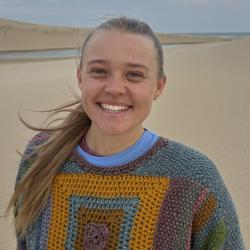
2nd Multi-Stakeholder Forum on the Greater Addo-Amathole Biodiversity Economy Node
As a fellow of the African Wildlife Economy Institute (AWEI), I am excited to attend the upcoming 2nd Multi-Stakeholder Forum on the Greater Addo-Amathole Biodiversity Economy Node. This forum presents a unique opportunity to deepen my understanding of the dynamics driving the wildlife economy and explore how large-scale conservation initiatives align with sustainable socio-economic development, particularly in the context of poverty alleviation and transformation.
My Master's research focuses on evaluating the socioeconomic and biodiversity outcomes of South Africa’s Wildlife Economy Programme (WEP), particularly through the lens of wildlife loans and donations to emerging farmers and communities. This research seeks to measure the impact of these programmes on both the environment and the livelihoods of those involved. I am conducting this research under the supervision of Dr Hayley Clements, with Dr Howard Hendricks as my co-supervisor.
Attending the forum will give me invaluable insights into the concept of 'mega living landscapes,' which seeks to integrate conservation with community-driven development across large, interconnected landscapes. The Global Environment Facility (GEF) emphasises sustainable development, inclusive growth, and biodiversity conservation, which aligns directly with my research goals. The forum will offer opportunities to learn from key stakeholders in the biodiversity economy, including the private sector, government, upcoming and established farmers and local communities, all of whom are critical in ensuring the success of initiatives like the WEP.
At the heart of both GEF 7 and my study is the drive for transformation, particularly in addressing poverty and inequality through inclusive economic activities that support biodiversity. I am particularly interested in how the forum will address the challenges and opportunities for integrating local communities and emerging farmers into wildlife economies. This aligns with my research goals of identifying how wildlife economy programmes can support rural economic development while simultaneously contributing to conservation goals.
Furthermore, the insights gained at the forum will enrich my understanding of structuring and evaluating effective wildlife economy programmes. I look forward to exploring best practices, discussing key policy developments, and networking with fellow conservationists, economists, and stakeholders committed to sustainable wildlife-based development.
I am grateful to AWEI for supporting my attendance at this forum, as it will further enhance the practical relevance and impact of my research on the future of South Africa's wildlife economy.
-

Klarine Schutte
Programmes Assistant & Research Associate
We support the free flow of information. Please share:
More content
-

As a fellow of the African Wildlife Economy Institute (AWEI), I am excited to attend the upcoming 2nd…
Articles -

A theory of change to improve conservation outcomes through CITES
Dr Michael 't Sas-Rolfes…Here we articulate the implied theory of change (ToC) underpinning the design and operation of CITES (Convention on...
2025Research -

Wild Meat Value Chain Integration Systems: Opportunities for Value Chain Formalisation and Scaling in Africa
Dr Wiseman Ndlovu…Establishing a legal, safe and sustainable wild meat sector promises to potentially reduce demand for illegally sourced meat...
2025Research -

AWEI's 2024 Wildlife Economy Dialogue Series
Ms Emily TaylorRediscover 2024: A year of insight and inspiration
In 2024, AWEI proudly hosted three ground-breaking dialogue series in…
Articles -
Evaluating key evidence and formulating regulatory alternatives regarding the UK's Hunting Trophies (Import Prohibition) Bill
Dr Michael 't Sas-Rolfes…We evaluate key evidence relating to the Hunting Trophies (Import Prohibition) Bill that was discussed in the UK...
2024Research -

The return of the UK's ill-conceived bill to ban hunting trophy imports
Prof Francis Vorhies…A recent report and poll reveal serious flaws in the UK government’s continued push to ban the importation…
Articles -

India’s Wildlife Economy: Balancing Conservation and Sustainable Use
Mathen ‘Rajeev’ MathewThe concept of a wildlife economy through the sustainable use of wildlife is increasingly recognised as a means…
Articles -

Leveraging free trade to boost Africa’s wildlife economies through wild-harvested products
Dr Wiseman NdlovuThe intra-Africa trade of wild products presents a unique intersection of economic opportunity and environmental conservation. With the...
2024Research -

Insights from the African Wildlife Economy Colloquium
Klarine SchutteThe inaugural African Wildlife Economy Colloquium, held from 4–6 November at Stellenbosch University, brought together a diverse group…
Articles
Get updates by email
Through impactful research, stakeholder engagement, and professional development, AWEI is supporting the wildlife economy across Africa. Please subscribe for occasional updates on our work and forthcoming events.
Sign up for a quarterly dose of AWEI insights
In a complex and changing world, AWEI generates strategic ideas, conducts independent analysis on wildlife economies, and collaborates with global scholar-practitioners to provide training and expertise for biodiversity conservation, climate resilience, and inclusive economic opportunities in Africa.
